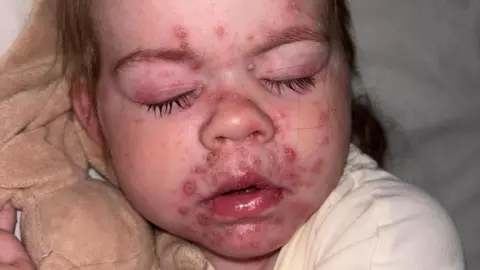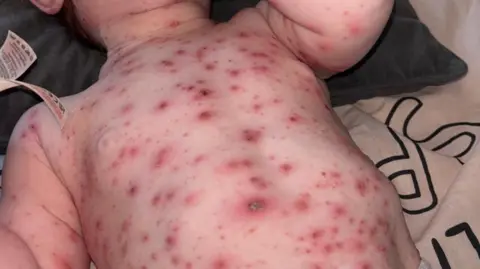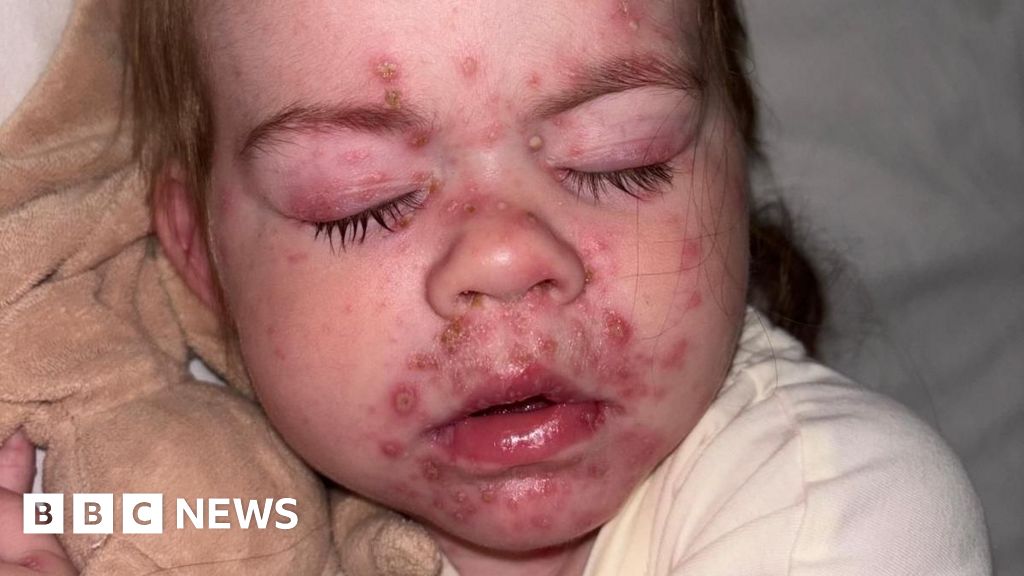Michelle RobertsDigital health editor, BBC News
 Sarah (Mia’s mum)
Sarah (Mia’s mum)All young children in England and Wales will be offered a free chickenpox vaccine by the NHS from January 2026.
It will be given as two doses, at 12 and 18 months of age, combined with the existing MMR jab which protects against measles, mumps and rubella.
A catch up campaign is planned for slightly older children so they don’t miss out.
Until now, parents who wanted to protect their child against the chickenpox varicella virus, which causes red itchy spots, have usually had to pay up to £200 privately.
Ministers hope offering the vaccine free will not only protect youngsters from the severe, although rare, complications of chickenpox, but also save parents taking time off work to look after a sick child.
According to the Department of Health and Social Care, chickenpox causes an estimated £24m in lost income and productivity every year in the UK.
Health minister Stephen Kinnock said: “We’re giving parents the power to protect their children.
“This vaccine puts children’s health first and gives working families the support they deserve.”
Chickenpox rash
Chickenpox is generally mild but can be very severe for some people.
Pregnant women are particularly at risk as it can cause complications for both the mother and her baby.
Very young infants and adults are also more likely to experience serious illness compared to children.
In rare cases it can cause a swelling of the brain, called encephalitis, an inflammation of the lungs, called pneumonitis, and stroke, which can result in hospitalisation and, in very rare cases, death.
The disease is transmitted through direct contact between people, or through airborne droplets in coughs and sneezes.
Illness can start with flu-like symptoms, such as a high temperature and headache.
A rash appears one to three weeks after exposure. Some children might have only a few itchy, red spots, but others can be covered in them.
Within a few days the spots turn into fluid filled blisters, which are contagious until they crust over to form scabs that eventually drop off and clear up.
Experts say vaccination will dramatically reduce the number of chickenpox cases overall, leading to far fewer of the more serious ones.
Dr Gayatri Amirthalingam, deputy director of immunisation at the UK Health Security Agency (UKHSA), said vaccination could be “a life saver” for some.
 Sarah
SarahSarah, who is a mother of two girls, says the vaccine would have helped her young daughters Willow and Mia.
Last year they both needed hospital treatment to recover from severe chickenpox.
Her youngest, Mia, developed spots “head to toe” and had a skin infection, which made her very unwell.
“She was just completely out of it…floppy.
“It was just an awful situation to be in.
“It was absolutely terrifying.”
She said she would advise parents to consider getting the vaccine: “I would never want any child or any parent to go through what we’ve been through.”
The virus that causes chickenpox – varicella zoster virus (VZV) – is extremely contagious, meaning it is very easy to catch from someone who is infected.
The vaccine reduces the risk of getting it to near zero. And if you do still catch chickenpox after being vaccinated, you’ll usually have milder symptoms.
Scotland and Northern Ireland are also expected to offer the vaccine on the NHS, but have not given a date yet.
Shingles, a painful skin rash condition, is caused by the same virus as chickenpox.
VZV stays in the body for life and can reactivate, causing shingles, if your immune defences are low.
People cannot catch shingles from someone with chickenpox. But they can catch chickenpox from someone with shingles if they have not had chickenpox before.
It is possible but very unusual to get chickenpox more than once.
A shingles vaccine is also available on the NHS for:
- all adults turning 65
- those aged 70 to 79
- those aged 50 and over with a severely weakened immune system
The announcement comes as new data revealed none of the main childhood vaccines in England reached the 95% uptake target in 2024/25.
Some 91.9% of five-year-olds had received one dose of the MMR vaccine, unchanged from 2023/24 and the lowest level since 2010/11, according to the UKHSA.

